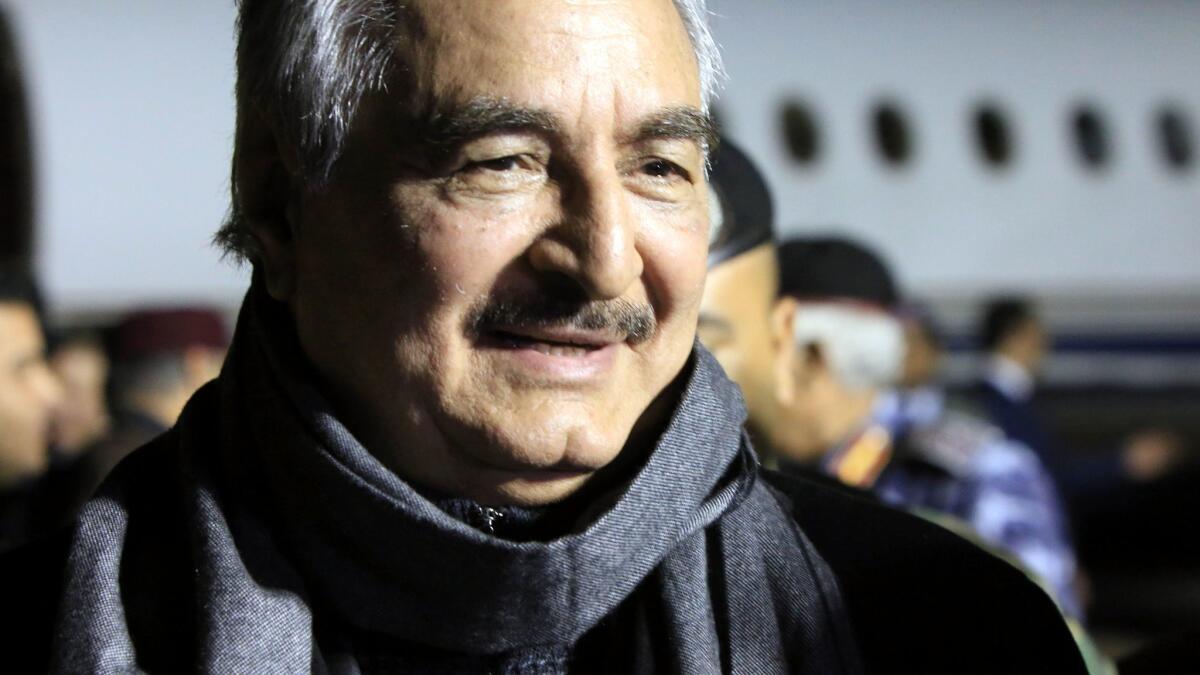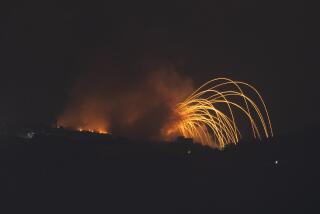In the battle for control of key oil installations in Libya, a military man takes center stage

- Share via
With Islamic State driven from its last urban stronghold in strife-ridden but energy-rich Libya, fresh turmoil is brewing over control of lucrative oil installations.
And a polarizing military figure who once enjoyed close U.S. support — Field Marshal Khalifa Haftar — is at the heart of the unfolding struggle.
The North African country is splintered by an array of rival armed groups, some of them loyal to one of two competing governments. Haftar has carved out a powerful fiefdom independent of the weak but internationally supported administration in the capital, Tripoli.
Three months ago, forces loyal to Haftar seized the main terminals at the heart of Libya’s “oil crescent,” a concentration of oil-shipping ports and facilities on the Mediterranean coast. That gave him and his ally, a rival government based in the country’s east, control over crucial oil exports, which currently amount to about 600,000 barrels of crude a day.
That grip has not gone unchallenged. This week, Haftar’s forces — the self-styled Libyan National Army — beat back a series of attacks by a loose coalition of armed groups based in western Libya. The attackers consisted of a mishmash of Islamist fighters and some backers of the Tripoli government, including a militia leader named Ibrahim Jadran, who headed a semi-official force that formerly controlled the oil facilities.
Few expect the fighting to end any time soon — but in the meantime, Haftar, who is based in Libya’s second city, Benghazi, has seen an exponential leap in his personal power and prestige in the months that the oil terminals have been under his thumb.
“It’s been a huge boost for him, and really shifts the momentum to his advantage,” said Frederic Wehrey, a senior fellow at the Carnegie Endowment for Peace. “He has credibly shown the international community he’s guarding the oil fields, and the oil is flowing, with revenue going into central coffers…. It’s an enormous card that he’s been able to play.”
Born in 1943, the field marshal — a title conferred on him by the eastern government, not recognized by the Tripoli one — has faced reversals of fortune before. In fact, they have defined Haftar’s long career.
A onetime key lieutenant of dictator Moammar Kadafi, who was killed in 2011 after being ousted in a popular uprising, Haftar fell out of favor after commanding Libyan forces on the losing side of a 1980s conflict in the neighboring African state of Chad. He fled into exile in the United States, and from a base in northern Virginia, cultivated close ties with the Central Intelligence Agency.
He returned to Libya to fight on the side of anti-Kadafi forces, but failed to achieve the degree of influence he had hoped for in the power struggle that erupted after the dictator’s downfall.
In 2014, he again burst into view when he went on national television to outline his plan for “national salvation,” launching a wide-ranging battle against Islamists who then held sway in Benghazi and other eastern towns and cities.
Backed by a number of former military commanders and an impressive array of military hardware left over from Kadafi’s time, Haftar won popular backing by doing what the then-central government could not: largely restoring stability in Benghazi and other eastern towns, where a local Al Qaeda affiliate, Ansar al Sharia had staged a chaotic campaign of assassinations and bombing attacks.
Confident and charismatic, Haftar has demonstrated an astute grasp of regional political forces at play. He won the support of Egypt’s President Abdel Fatah Sisi, whose stridently anti-Islamist views dovetail neatly with Haftar’s, and of the United Arab Emirates, another avowed enemy of the Islamists.
Haftar is also well-positioned to take advantage of a newly assertive Mideast stance by Russia. He has made several trips to Moscow this year, most recently last month, when he was photographed in a Russian-style fur hat as he headed to high-level official meetings.
Russian news reports said he may have submitted a “wish list” of weapons if a U.N. arms embargo applying to all parties in Libya except the Tripoli government was lifted.
And Haftar and his allies are said to have been heartened by the incoming U.S. administration of President-elect Donald Trump. Analyst say Haftar’s inner circle believes the new American president may tilt away from the Tripoli government, which has some Islamist-leaning elements — even if that means breaking with the United Nations and Europeans.
The Tripoli government “is in a very weak position in relation to Haftar, and that’s a big turnaround,” said Richard Reeve, a Libya expert at Britain’s Oxford Research Group, an independent think tank. “He’s a force to be reckoned with.”
Though the field marshal will probably stay in the spotlight and continue to flex his military muscle, Libya’s other power struggles haven’t gone away.
The battle against Islamic State in the coastal city of Surt, though unrelated to the struggle for the oil installations Haftar controls, sapped the strength of powerful militias based in the western city of Misrata. The seven-month campaign to retake Surt ended this week when the Misratans and their government-allied supporters finally cleared out the last square city block Islamic State fighters were holding.
Islamic State, although ejected from its only urban redoubt in Libya, nonetheless remains a threat, according to analysts and the U.S. military, which oversaw coalition airstrikes against Islamic State positions.
“There’s still ISIS in Libya,” Pentagon spokesman Capt. Jeff Davis said after Surt was declared free of the militants, using another acronym for the group. “They are out in the desert, they are underground, they have blended into the population, and they are going to be a challenge for the Libyan government in the future.”
Amid Libya’s volatile political landscape, Haftar’s wider ambitions may be limited by unpopularity outside his eastern sphere of influence. In other parts of the country, he is despised for both his American links and his past as a Kadafi confidant and enforcer, with Islamists holding him in particular disdain.
But some of Haftar’s backers aspire to greater powers for him, with some suggesting that the entire country would benefit from emergency military rule — presided over by the field marshal.
“His opponents accuse him of being another Kadafi, of wanting to take Libya back to a military dictatorship,” Wehrey said. “He’s a military man through and through, and he wants to have a seat at the table — he’s emerged as the indispensable power broker in Libya.”
More to Read
Sign up for Essential California
The most important California stories and recommendations in your inbox every morning.
You may occasionally receive promotional content from the Los Angeles Times.










